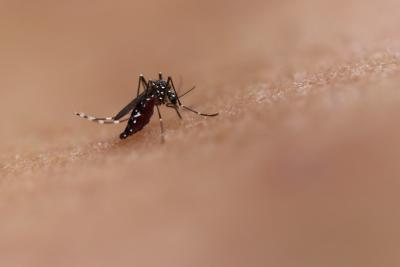Cornell Professor: Environment Drives Mosquito-borne Diseases
NIAID Recognizes World Mosquito Day on Saturday, Aug. 20
The World Health Organization (WHO) estimates that vector-borne illnesses account for more than 17% of all infectious diseases worldwide and are responsible for more than 700,000 deaths annually. Mosquitoes, which some may argue are the most nefarious among the creepy-crawly swarm of vectors, spread diseases like malaria, dengue, and Zika to humans, causing devastating disease and death worldwide. WHO reports that malaria caused 627,000 deaths in 2020, with the majority being in children younger than five years old. Dengue, also known as breakbone fever, adds another 40,000 to the annual death toll (WHO).
With the growing threat of climate change, researchers are examining how mosquitoes will adapt to warming temperatures and what impact this may have on their ability to transmit pathogens, or disease-causing organisms, to humans.
NIAID-supported researcher Courtney Murdock, Ph.D., associate professor in the Department of Entomology at Cornell University in New York, is researching environmental drivers of malaria transmission and is examining interactions among vectors, pathogens, and vertebrate hosts. She has found that climate change may increase the economic and health burden of vector-borne diseases by altering vectors’ immune responses, increasing their geographic distribution, and modifying their behavior. NIAID spoke with Dr. Murdock to learn more about her research team’s work.
How do environmental factors affect mosquitoes and their ability to transmit disease-causing pathogens?
Because mosquitoes are ectothermic, or cold-blooded, temperature is going to have a big impact on basically all aspects of their life cycle. This is because their internal body temperatures are going to quickly track changes in the ambient temperature. This is going to have important implications for their metabolic rates, physiology, development, survival, activity, and their environments, as well as their overall fitness.
Humidity is also going to be important. Temperature and humidity will affect the desiccation (removal of moisture) stress that an organism experiences. Adult mosquitoes, for example, living in warm, arid environments are going to be subject to more desiccation stress if water is limited than those living in humid, warm environments. In general, the availability of water and temperature constraints are important determinants of mosquito distribution across the globe. If environments are climatically suitable for mosquitoes, mosquito populations could, in theory, be larger. They could persist for longer, and potentially be active for longer periods of the day or season.
Why are warming temperatures expected to expose so many new people to mosquito-borne diseases?
If we’re just talking about temperature and thermal suitability, we would expect that, as temperatures warm in northern latitudes, those environments would become more suitable for disease transmission. But which mosquito-borne diseases will be most affected by climate change? I would expect that it’s going to be diseases that are transmitted by vectors that are active during the daytime—such as Aedes mosquitoes, the vector for dengue, Zika, and other diseases —and not likely at as high of transmission rates as we may see currently in the tropics.
For example, in the U.S, I don’t anticipate malaria becoming a problem in the future because Anopheles mosquitoes bite at night. We have housing with air conditioning, and screens that make it hard for those vectors to get in and get out. So, we interact with mosquitoes in our environments differently than in other areas of the world where vector-borne diseases are currently a big problem, and we have fairly wide access to healthcare resources. Now, in areas where temperatures are currently optimal for transmission, if those temperatures move away from being optimal, you could make predictions that mosquito-borne diseases would decline.
What are the greatest challenges to modeling the effects of warming on mosquito-borne disease transmission?
One of the greatest challenges is the lack of high-quality data that can go into informing some of these models. Specifically, we lack data from a diversity of systems on how environmental variation will impact traits that govern mosquito population dynamics and disease transmission. There are statistical models that are good at prediction for a certain set of scenarios, but these models might breakdown when those scenarios change. Then there are mechanistic models which build in the biology of the system and known relationships, that are good at predicting under change, but are really data hungry. It’s trying to balance the data-hungry nature of these models with the lack of high-quality data that’s a real challenge.
How does your research benefit public health?
I guess the pie-in-the-sky goal for my research program is that the data we generate on how key environmental variables impact mosquito populations and disease transmission will allow us to build more accurate and precise predictive models. These models could then be used in combination with intervention efforts to proactively mobilize intervention efforts or target intervention efforts to regions of the world, or even at a finer scale within a city, to enhance disease control.
Which research projects are you currently working on that you are most excited about?
I have one NIAID-supported project right now that I’m very excited about. It investigates how temperature and relative humidity interact to affect urban malaria transmission. There’s been a lot of work done with temperature, but not other environmental variables. And there’s even less work done looking at how environmental variables interact, and they most definitely will interact. This grant is exciting because it combines large-scale environmental experiments in the lab with the vector and the parasite geared toward defining environmental relationships. We’re then taking these data and putting them into novel, mechanistic models to predict how urban malaria varies seasonally and spatially within a city. The output of this work will help local municipalities be more informed on control efforts.
NIAID is supporting research on climate change’s impact on health. Funding opportunities can be found on the NIAID website.




